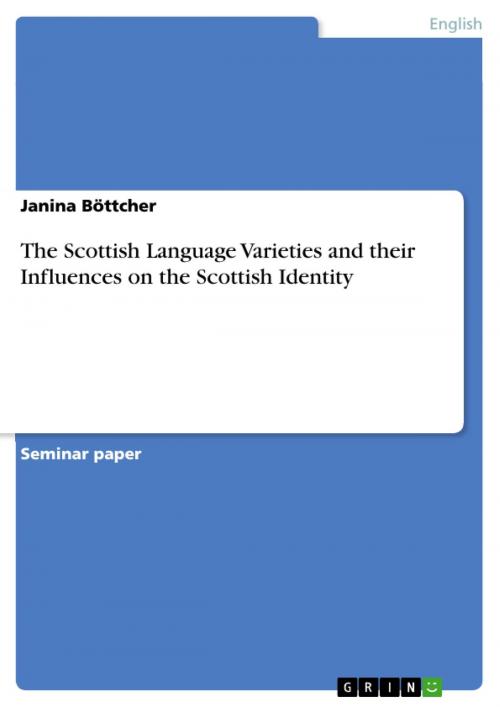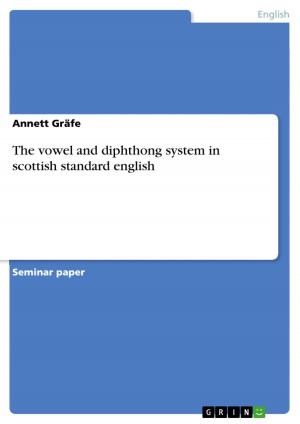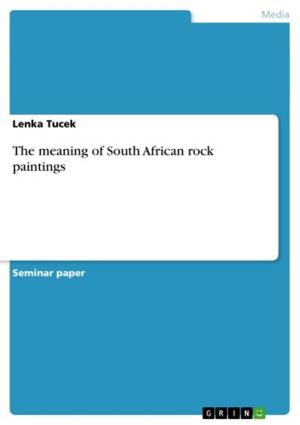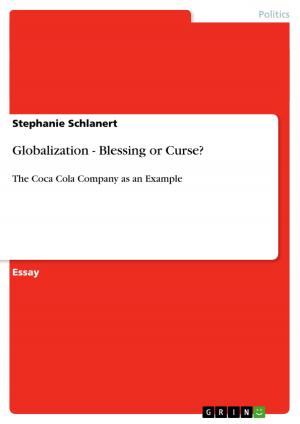The Scottish Language Varieties and their Influences on the Scottish Identity
Reflections on a Variety
Nonfiction, Entertainment, Drama, Anthologies| Author: | Janina Böttcher | ISBN: | 9783640368907 |
| Publisher: | GRIN Publishing | Publication: | July 8, 2009 |
| Imprint: | GRIN Publishing | Language: | English |
| Author: | Janina Böttcher |
| ISBN: | 9783640368907 |
| Publisher: | GRIN Publishing |
| Publication: | July 8, 2009 |
| Imprint: | GRIN Publishing |
| Language: | English |
Seminar paper from the year 2005 in the subject English Language and Literature Studies - Linguistics, grade: 1,0, University of Potsdam (Institut für Anglistik/ Amerikanistik), course: Scots and the other languages of Scotland, language: English, abstract: When people think of Scotland the images they have in mind are usually very restricted. Most of us combine the country with the myth of Nessie, the Clans and their tartan culture, the good whisky, the Highlands and the famous Highland Games. All these existing images of Scotland make up a large part of the country's culture but Scotland is more than that. Only the minority of us might think of Scotland as a country with a long and problematic history and just some are regarding the fact that it has still not gained its entire independence. It is a country full of contrasts and difficulties which you cannot only become aware of when you consider the geographical situation but also the social, political and cultural circumstances. A today's problem resulting from Scotland's long history is the question of Scottish identity, and accompanied by that the language problem. Language is an element of culture and people express through their language and speaking behaviour identities and attitudes. In Scotland the situation is quite difficult. As part of the United Kingdom the official language spoken in Scotland is Standard English but depending on the area you are visiting, you can also find speakers of other varieties such as Scots or Gaelic or even dialects. However, these varieties are said to be non- standardised languages and therefore are not officially used in Scotland. That leads to the problem that speakers of these varieties have the feeling not to be part of the speaker community and consequently they cannot identify themselves with these. The issue that now has to be surveyed, is the question what types of languages are existing in Scotland and how do these language varieties influence the identities and attitudes of Scots. For that reason I have planned to concentrate on one of Scotland's languages and would like to write my paper about the Scots and their tongue. In the first part I will deal with the Scots, their nation and their development. The main focus in my work will be the re-flection on Modern Scots, the problematic of the Scots' status and its varieties. I am going to discuss if it is a distinct language, an accent or a dialect and will also look at the different varieties of Scots inside and outside of Scotland to give an overview of existing forms.
Seminar paper from the year 2005 in the subject English Language and Literature Studies - Linguistics, grade: 1,0, University of Potsdam (Institut für Anglistik/ Amerikanistik), course: Scots and the other languages of Scotland, language: English, abstract: When people think of Scotland the images they have in mind are usually very restricted. Most of us combine the country with the myth of Nessie, the Clans and their tartan culture, the good whisky, the Highlands and the famous Highland Games. All these existing images of Scotland make up a large part of the country's culture but Scotland is more than that. Only the minority of us might think of Scotland as a country with a long and problematic history and just some are regarding the fact that it has still not gained its entire independence. It is a country full of contrasts and difficulties which you cannot only become aware of when you consider the geographical situation but also the social, political and cultural circumstances. A today's problem resulting from Scotland's long history is the question of Scottish identity, and accompanied by that the language problem. Language is an element of culture and people express through their language and speaking behaviour identities and attitudes. In Scotland the situation is quite difficult. As part of the United Kingdom the official language spoken in Scotland is Standard English but depending on the area you are visiting, you can also find speakers of other varieties such as Scots or Gaelic or even dialects. However, these varieties are said to be non- standardised languages and therefore are not officially used in Scotland. That leads to the problem that speakers of these varieties have the feeling not to be part of the speaker community and consequently they cannot identify themselves with these. The issue that now has to be surveyed, is the question what types of languages are existing in Scotland and how do these language varieties influence the identities and attitudes of Scots. For that reason I have planned to concentrate on one of Scotland's languages and would like to write my paper about the Scots and their tongue. In the first part I will deal with the Scots, their nation and their development. The main focus in my work will be the re-flection on Modern Scots, the problematic of the Scots' status and its varieties. I am going to discuss if it is a distinct language, an accent or a dialect and will also look at the different varieties of Scots inside and outside of Scotland to give an overview of existing forms.















